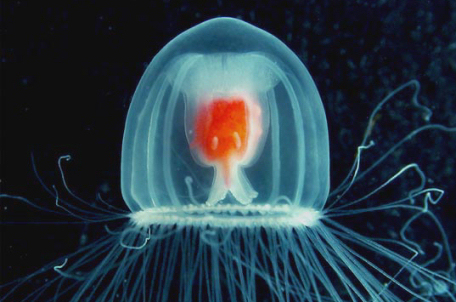If you’re thinking McLeod, you couldn’t be further from the truth. What you have to do is think small; not microscopic, just big enough to see with your naked eye. Turritopsis nutricula is a hydrozoan, and it’s considered by scientists to be the only animal that cheated death.
Solitary organisms are (according to current belief) doomed to die, after they completed their life cycle. Hydrozoa are a huge class of predatory animals that live mostly in saltwater, closely related to jellyfish and corals. Eggs and sperm from an adult jellyfish (medusa) and they then develop into polyp stage. Medusae evolve asexually from polyps.
Still, our Turritopsis nutricula (could we call it Joe??) managed to find a way to beat that. What these little folks do is they revert completely to a sexually immature, colonial stage after they reach sexual maturity. They’re even cooler than that. When they’re young they’ve got only several tentacles, but at a mature stage, they get to 80-90 of them.
They’re able to return to polyp stage due to a cell change in the external screen (Exumbrella), which allows them to bypass death. As far as scientists have been able to find out, this change renders the hydrozoa virtually immortal.
via Meet the world’s only immortal animal | ZME Science.
If sexual immaturity was the key to immortality ... (INSERT JOKE HERE). But seriously ladies and polyps, this is one of the most amazing discoveries ever ... if it is true. First, we need to get our population down to something sustainable, but then ... we should figure this out and use it to bypass death.
Turritopsis nutricula is a hydrozoan with a life cycle in which it reverts to the polyp stage after becoming sexually mature. It is the only known case of a metazoan capable of reverting completely to a sexually immature, colonial stage after having reached sexual maturity as a solitary stage (Piraino et al. 1996, p. 302). It does this through the cell development process of transdifferentiation. Theoretically, this cycle can repeat indefinitely, rendering it effectively immortal. - wiki
Transdifferentiation in biology takes place when a non-stem cell transforms into a different type of cell, or when an already differentiated stem cell creates cells outside its already established differentiation. ... Transdifferentiation takes place in nature in a few specific cases. For example, in salamanders and chickens when the lens of the eye is removed, cells of the iris turn into lens cells. Still, such naturally occurring cases, or even ones created in the laboratory are rare. ... Evidence for transdifferentiation in adult humans is given by Barrett's metaplasia in which epithelieal cells of the esophagus switch to intestinal mucin-secreting goblet cells. Barrett's metaplasia predisposes people to adenocarcinoma, with an 80% mortality rate. - wiki
Some more detail. Seems to be true.
Hydrozoan cnidarians usually have a complex life cycle, wherein a colonial stage leads to the sexually mature, solitary, adult stage. Eggs and sperm from solitary, sexual, adult medusa (jellyfish) develop into an embryo and planula larva, and they then form the colonial polyp stage. Medusae are formed asexually from polyps. These medusae have a limited lifespan and die shortly after releasing their gametes
... The hydrozoan Turritopsis nutricula has evolved a remarkable variation on this theme, and in so doing appears to have achieved immortality. The solitary medusa of this species can revert to its polyp stage after becoming sexually mature (Bavestrello et al., 1992; Piraino et al., 1996). In the laboratory, 100% of these medusae regularly undergo this change. Thus, it is possible that organismic death does not occur in this species!
How does Turritopsis accomplish this feat? It can do this because it can alter the differentiated state of a cell, transforming it into another cell type. Such a phenomenon is called transdifferentiation, and it is usually seen only when parts of an organ regenerate. However, it appears to occur normally in the Turritopsis life cycle (Figure 2). In this transdifferentiation process, the medusa is transformed into the stolons and polyps of a hydroid colony. First, the umbrella everts and the tentacles and mesoglea (the middle layer) are resorbed. The everted medusa attach to the substrate by the end that had been at the opposite end of the umbrella, and spawning occurs shortly thereafter. The cnidarian then secretes a perisarc (stolon covering) and stolons. Two days after the stolons are first seen, polyps differentiate. These polyps feed on zooplankton and soon are budding off new medusae.
... Turritopsis nutricula is the first case in which a metazoan is capable of reverting completely to a sexually immature, colonial stage after having reached sexual maturity as a solitary stage. Thus, it appears that it has cheated death and is a potentially immortal, solitary metazoan. - devbio

1 comment:
We should name him 'Squishy' :)
Post a Comment